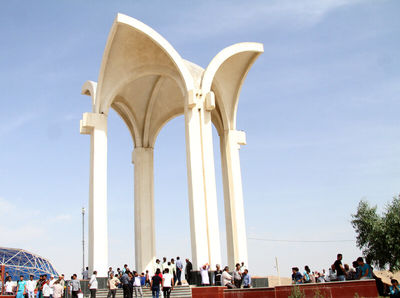The Vice Minister of Culture of Turkmenistan, Nursakhet Shirimov, the executive secretary of the Turkmen National Commission for UNESCO, Chinar Rustemova, and a group of Golestan cultural officials attended the celebration.
In his brief speech, Shirimov thanked the people of Golestan Province for their hospitality and said, “Magtymguly’s poetry presents patriotism and unity, and holding the celebration considerably helps expand the relations between Iran and Turkmenistan.”
Rustemova also said that on behalf of Turkmenistan President Serdar Berdimuhamedow and the people of the country, she expresses her thanks to Iran for organizing the birthday celebration.
“Although Magtymguly Pyragy is a Turkmen poet, he doesn’t belong only to one nation, but he belongs to all the people of the world,” she added.
Magtymguly Pyragy, also spelled Makhtumqoli Faraghi, was a Turkmen spiritual leader, philosophical poet and Sufi who is considered to be the father of Turkmen literature and the most famous figure in Turkmen literary history.
Born in C. 1733 in Hajjigowshan, a village near Gonbad-e Qabus in the modern-day province of Golestan, Iran, Magtymguly received his early education in the Persian and Arabic languages from his father, Dowletmammet Azady, a leading Turkmen scholar.
Magtymguly studied in various madrassahs, including Idris Baba Madrassah in the village of Gyzyl Ayak, Sirgazy Madrassah in Khiva and Gogeldas Madrassah in Bukhara.
After returning home, Magtymguly worked as a silversmith, and taught and wrote poetry. He developed a realistic style of writing about 18th-century Turkmen that became very popular and led him to become one of the most cherished Turkmen poets of all time.
Some of his poetry, along with stories collected from Turkmen oral traditions, suggests that he was taken prisoner, most likely in Mashhad, Iran. It is unknown who took him captive but such events were common in 18th-century Iran and the Turkmenistan region.
Magtymguly’s poetry is often personal and takes up universal themes. His work includes elegies on the deaths of his father and children, the disappearance of his brothers, incitements to Turkmen unity, tirades against unjust Muslim teachers of religion and khans, praises of Muslim religious figures, and lamentations over losing his lover to another man.
The divan of Magtymguly Pyragy has been translated into Persian by a team of translators consisting of Mashhadqoli Qezel, Musa Jorjani, Hajji Mohammad Qaranjik, Khal-Mohammad Peqeh and Asher-Mohammad Raufi.The collection will be published in four volumes in the near future.
Source:Tehran Times

